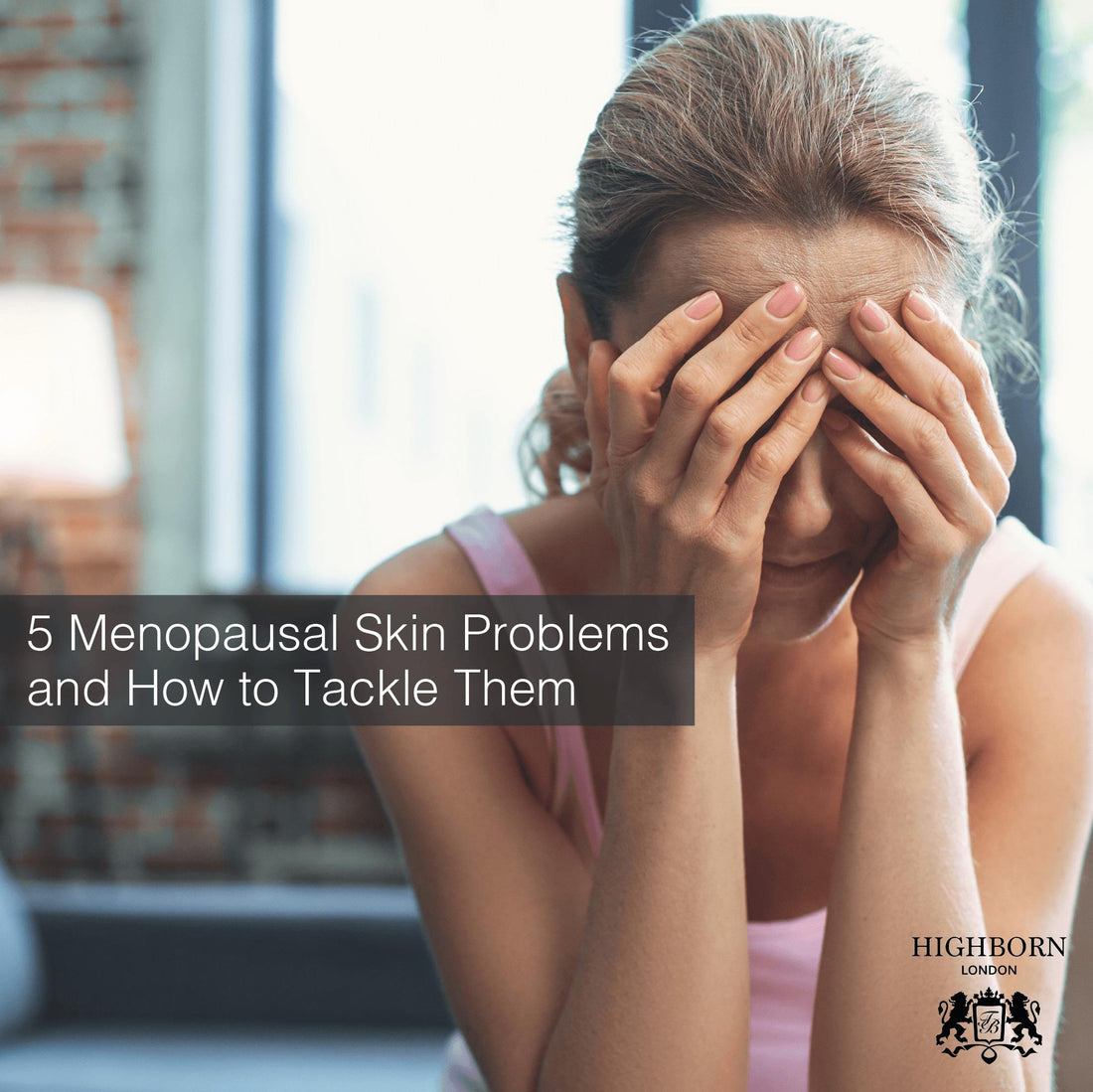
Take Control of Menopausal Skin with Guest Dr Rachael Myers
Share

The menopause is a perfectly natural stage of every woman’s life, affecting those going through it in many ways. From hot flushes and mood swings to a lack of energy, aching joints and even palpitations. Not to mention causing your skin to have a complete meltdown. It can be a very troubling time.
“As well as the common physical symptoms, women can experience dramatic changes in their skin such as dryness, sensitivity, breakouts, hyperpigmentation and collagen loss leading to thinning, sagging and wrinkles,” explains Dr Rachael Myers, General Practitioner and longstanding HIGHBORN Ambassador.
"These changes can also contribute to significant loss of self-confidence and low mood," she adds.
So, why does menopausal skin rarely get talked about? Well, the whole topic is seen as slightly taboo, so it’s no wonder the skin discussion gets brushed under the carpet.
But we’re here to change that. Because we believe menopause-related skin changes can have a significant impact on your mental and physical wellbeing.
“Although the menopause is a natural part of ageing for women, we definitely don’t have to suffer the effects in silence,” says Dr Myers.
So, let’s begin. It’s time to change the taboo and take control where you can...
What Happens To Your Skin During Menopause
Well, let’s not get ahead of ourselves because before the menopause comes perimenopause.
“Usually women enter the perimenopause between ages 45-51 and this is brought about by declining levels of oestrogen and progesterone,” explains Dr Myers.
During this time you may start to experience symptoms like irregular periods, sleep problems and even hot flushes. For many, this can begin years ahead of the menopause, whereas for others it could be as little as a few months.
But whatever the time span, your ovaries eventually produce so little oestrogen that they no longer release eggs and your periods stop.
“It’s only when you’ve had no period for 12 consecutive months that you’ve officially reached the menopause,” says Dr Myers.
So, what does all this mean for your skin? Well, as the menopause progresses, your female hormones continue to freak out and decline, while collagen production simultaneously decreases as part of the natural ageing process.
Oestrogen helps your skin retain water so when these levels drop, skin is less able to moisturise itself. Meanwhile, collagen helps your skin remain plump and firm, so depleted numbers spell similar bad news for the look and feel of your skin.
Depending on your inherent skin type, menopausal symptoms can vary from dryness and itching, through to sensitivities and breakouts. Let’s just say ‘unpredictable’ is the best word to describe your skin right now. Sigh.
Below, we look into the five most common, menopause-related skin concerns. And show you how to treat them with a few HIGHBORN favourites…
1. Dryness And Dehydration
Studies show that almost half of women in the UK suffer with dry skin and/or dehydration during the menopause as oestrogen levels drop, cell turnover becomes sluggish and your sebaceous glands start to slow down. During this time there’s also a depletion in your skin’s NMF (natural moisturising factor) whose role is to keep your skin healthy and hydrated.
Without a well-rounded NMF your skin’s protective barrier becomes weakened and its ability to retain water and natural lipids is compromised. Hence the dryness, dehydration and sensitivities that often go hand-in-hand with the menopause.
How To Treat It
To help counteract dryness and dehydration, use only the gentlest of cleansers and invest in rich, hydrating moisturisers like Imperial Moisturiser and Night Elixir. Apply these morning and night (without fail) to slightly damp skin to lock in moisture.
Then, apply our Organic Age-Defying Facial Oil twice daily after moisturising to really amp up your oil game. The combination of these formulations will feed your skin with vital nutrients, fatty acids and thirst-quenching humectants (the things that help draw water to the top layers of your skin).
2. Hormonal Acne
For some, the menopause could result in an onslaught of hormone-related acne similar to when you were a teenager. This is likely due to oestrogen levels dropping, while androgens like testosterone remain slightly more constant causing an imbalance of male vs female hormones.
Just like any hormonal acne, menopausal acne can take the form of blackheads, whiteheads, pimples and even full-on cysts that form deeper under your skin. Never fun.
How To Treat It
If your breakouts are fairly mild, look for anti-inflammatory, healing ingredients such as tea tree oil, aloe vera, salicylic acid and niacinamide. Our Organic Hydration Gel is deeply nourishing and won’t clog your skin, making it ideal for skin that’s flaring up.
For serious breakouts and hormonal cysts, however, always seek help from your GP or a dermatologist. Most importantly, don’t pick or squeeze those spots – when hormone levels fall, skin takes much longer to heal and will likely scar. You have been warned.
3. Thin, Sagging Skin
If you’ve noticed your skin has become thinner and started to sag – particularly around your jowls – this is all down to losing valuable collagen. Research shows that during the first five years of the menopause, your skin loses about 30 percent of its natural collagen levels, followed by around 2 percent every year after that.
As collagen becomes less and less, your skin will lose its youthful plumpness and begin to go south.
How To Treat It
Ingredients that help stimulate collagen production should be a real priority here – namely, retinoids and peptides. Our Pre-Eminent Beauty Serum combines retinol with aloe vera, glycerine, hyaluronic acid and vitamins C and E for a fantastic hit of anti-ageing ingredients that’s perfect for menopausal skin.
4. Dark Spots
Any areas of hyperpigmentation will become much more prevalent throughout your menopausal years as your hormones go wild, skin becomes thinner and sun damage continues to build.
Hormonal dark spots are known as melasma and may appear not only on your face, but on your shoulders, neck and arms – basically the places that are most often exposed to the sun.
How To Treat Them
Your best course of action is to protect your skin with a combination of antioxidants like vitamin C and a broad-spectrum SPF every time you go outside. Better still, choose a tinted formulation that will help camouflage dark spots as well as protect your skin from damaging UV radiation.
Organic Tinted Moisturiser with SPF 25 is just the ticket for moisturising, protecting and enhancing your skin for a beautiful, dewy glow every day. And good news, the new batch is almost ready so join the waitlist and be the first to hear. www.highbornlondon.com/pages/otm-launch
5. Fine Lines & Wrinkles
A severe slow-down in cell turnover, coupled with a lack of natural lipids, the inability to retain moisture and less naturally-produced collagen will do nothing for your lines and wrinkles during menopause.
Fine lines that used to only appear when you smiled or frowned may become permanently etched in around this time, and new ones could also start to appear – especially between your nose and corners of your mouth.
How To Treat Them
All of the above products and advice will go a long way to keeping the visible signs of ageing under control, but you should also exfoliate regularly with Natural Luminosity Scrub to remove dead skin cells and boost turnover.
Exfoliating also helps your skin absorb other skincare products better, making your serums, moisturisers and facial oils much more effective as an added bonus.
“Finally, simple lifestyle changes can be a great place to start for making a difference to skin health and menopausal symptoms,” advises Dr Myers.
“Regular weight bearing exercise not only helps boost cortisol levels and your mood, but it will also minimise the bone density changes that occur with lack of oestrogen. Diet changes to boost calcium, vitamin B and C; lowering your cholesterol and reducing alcohol and caffeine intake can all make a difference too.
If you are struggling with the effects of menopause there are many natural remedies that have also been proven to help. Black Cohosh, Red Clover and Oil of Evening Primrose are worth a try. Of course, for many, hormone replacement therapy (HRT) is the real gamechanger.
So, please don’t suffer, have the conversation with your GP and get back to being the confident, empowered individual you deserve to be!”

5 comments
Great advice and very helpful thank you. I am peri menopausal, oh joy! I recently found my skin starting to change quite dramatically as you’ve explained above. Your products were recommended to me by a friend and I started using them on Mother’s Day and I have to say I’ve noticed a huge difference!!! My lovely husband surprised me with your 7 phase collection and I’ve just reordered more, the beauty serum and eye gel feel amazing on my skin and already my skin feels and looks much more like my younger self again! Can’t recommend your products enough so thank you. My one question is does your daily moisturiser contain any sun protection please?
Its good to know the things to help. I have noticed I have signs of menopause and starting to sag skin around jowls. I love the products I have purchased the eye gel, and beauty serum, and age defying facial oil. I am sure to order other items as I require them.
Good advice, I have been through the above article, have ordered moisturiser and eye gel interested to see how they work for me, I’m 68 and have always tried to take care of my skin, but now feeling it needs some extra help.
Hi, Thank you for the above. Have you any suggestions for paper thin skin on legs and arms. Since entering and passing through the menopause, my skin has become increasingly thin and dry.
Many thanks
Sue
Thank you I’m going though the menopause and everything you have said is right and very helpful